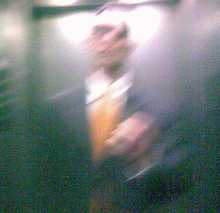My wife and I are in our hotel room, the night before we are due to return home. We have an early morning flight so we need to set the hotel alarm clock. This clock has custom stenciled instructions. You can see a photo of this "interface" in this blog entry below. Note the last line of said instructions: "Press ENTER".
 Huh? Where do you see ENTER? There is no enter key; the word ENTER does not appear anywhere on the front or back of the clock. How does a hotel employee or clock manufacturer manage to create instructions that require that the user press a non-existent key?
Huh? Where do you see ENTER? There is no enter key; the word ENTER does not appear anywhere on the front or back of the clock. How does a hotel employee or clock manufacturer manage to create instructions that require that the user press a non-existent key?There is a fair amount of innovation going on in the economy as devices get smarter (Rijsdijk et al. 2007). More and more the economy is going to depend on the ability of people to explain tasks, procedures and interfaces to consumers. If this is any indication, we are all in trouble!
Further Reading
Norman, Donald A. (1994) The Design of Everyday Things, New York: Doubleday.
Rijsdijk, Serge A., Erik Jan Hultink, and Adamantios Diamantopoulos (2007), "Product Intelligence: Its Conceptualization, Measurement and Impact on Consumer Satisfaction," Journal of the Academy of Marketing Science, 35 (3), 340-356.


No comments:
Post a Comment